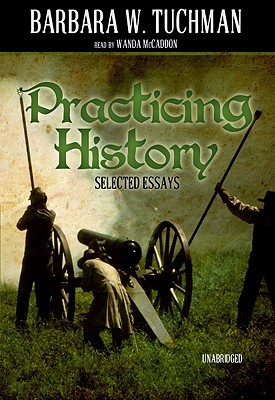

 |

|

The average rating for Practicing History: Selected Essays (Library Edition) based on 2 reviews is 4 stars.
Review # 1 was written on 2009-04-11 00:00:00 Keenan Kirimli Keenan KirimliI'm somewhat new to Tuchman, having read only The Guns of August and this 1981 compilation of essays and speeches ranging from the 1930s to the 1970s. By far the most interesting pieces are in the first section, "The Craft," where she discusses her habits of research and writing. Among her pointers: use primary sources only; and edit ruthlessly. Resist including some irresistible anecdote if it doesn't help or advance your narrative. The second section is titled "The Yield" - meaning what her craft yielded - and the third section is titled "Learning from History." In this section, "Why Policy-Makers Do Not Listen" was very good, because it contains little historical set-pieces rather than simply opinion. Here we learn why President McKinley did not listen when deciding whether to annex the Philippines, why President Wilson did not listen when sending the Marines to Vera Cruz, and why President Roosevelt did not accept the truths of the Stalinist purges which were being reported to him by American Embassy staff in Moscow. Tuchman mentions several pieces that she had axed from the collection pre-publication because they read as too out-of-date, including an account of President Kennedy's funeral. But her 1967 piece "Israel: Land of Unlimited Impossibilities," reads today as almost ridiculously boosterish. Rather than standing up to the test of time, her criterion for inclusion, it seems like something frozen in a cheery time capsule. And the essay "Israel's Swift Sword," written also in 1967, for The Atlantic, has such a worshipful tone it could have been ghostwritten by the IDF. It contains the not very historical sentence "Where the Jew questions, the Arab dreams," and points more starkly than any other essay here to Tuchman's own dictum that "a historian needs...a perspective of at least twenty-five years, and preferably fifty, to form an opinion of any value." From the perspective of the 21st century, these two might be the weakest pieces, although they do have some competition. Her writing is strongest when she's writing actual history, not opining on Vietnam or Watergate (which, when she was writing about them, were current). Those particular essays don't stand out from the crowd of contemporary opinion pieces on the subjects. |
Review # 2 was written on 2012-06-21 00:00:00 David Murray David MurrayI started out loving Barbara Tuchman's book of essays. The first eight essays, on the craft of writing history, sent me over the moon. My ardor went down just a degree or two in the next section, which might be described as history in small chunks. Although the final section, in which she comments about (1960-1970) current affairs, yields nuggets, I found myself in disagreement with Tuchman and disengaged with her writing. It seems to me the further away the period about which she writes, e.g. Medieval times, the Great War, the more I like her. That said, I would have no qualms recommending this book to an aspiring writer or an avid student of history. |
CAN'T FIND WHAT YOU'RE LOOKING FOR? CLICK HERE!!!